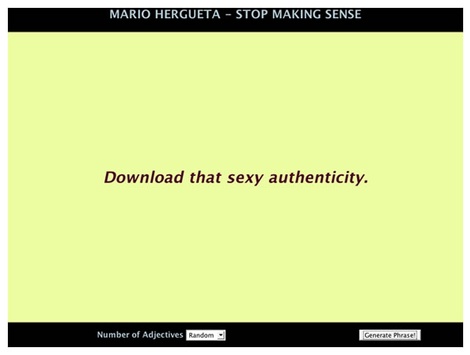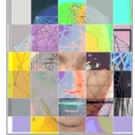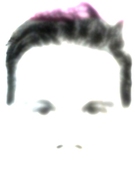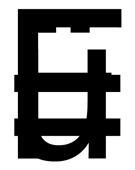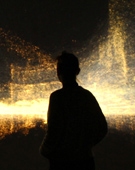With the help of a sentence-generating program geared at putting out sentences with or without adjectives, this work ends up showing the limits of the machine's creating potential.
By means of a statement-generating program, the work invites visitors to make up sentences and insert either none, or one or two adjectives, or leave this choice at random. This activity, based on simple foundations, gives rise to an extremely instructive examination of language and its structure. The statements without adjective appear definitely more directing and authoritative while those which include epithets moderate the remarks. The integration of two adjectives quickly turns the statement into forms that are either affected or obscure. These differences are accentuated when the visitor lets the machine form sentences randomly. They succeed each other in opposition. On occasion, the machine achieves pretty amalgams, worthy of poetry. The proposals relate to art, language, technology, and offer various points of view on the world. Gradually, the artificial character of the sentences stands out and reveals the insufficiency of this automated literature. Not without humour, the work makes fun of the naive belief that the machine can eventually replace the human mind. Moreover, it casts an amused glance at the theoretical, philosophical or common considerations swamping us every day with a tone of authority.
Sylvie Parent Le magazine électronique du CIAC No.9
Full Description
With the help of a sentence-generating program geared at putting out sentences with or without adjectives, this work ends up showing the limits of the machine's creating potential.
By means of a statement-generating program, the work invites visitors to make up sentences and insert either none, or one or two adjectives, or leave this choice at random. This activity, based on simple foundations, gives rise to an extremely instructive examination of language and its structure. The statements without adjective appear definitely more directing and authoritative while those which include epithets moderate the remarks. The integration of two adjectives quickly turns the statement into forms that are either affected or obscure. These differences are accentuated when the visitor lets the machine form sentences randomly. They succeed each other in opposition. On occasion, the machine achieves pretty amalgams, worthy of poetry. The proposals relate to art, language, technology, and offer various points of view on the world. Gradually, the artificial character of the sentences stands out and reveals the insufficiency of this automated literature. Not without humour, the work makes fun of the naive belief that the machine can eventually replace the human mind. Moreover, it casts an amused glance at the theoretical, philosophical or common considerations swamping us every day with a tone of authority.
Sylvie Parent Le magazine électronique du CIAC No.9
Work metadata
- Year Created: 2007
- Submitted to ArtBase: Saturday Mar 10th, 2007
- Original Url: http://www.marioland.de/nosense/index.htm
-
Work Credits:
- Mario Hergueta,
Take full advantage of the ArtBase by Becoming a Member
